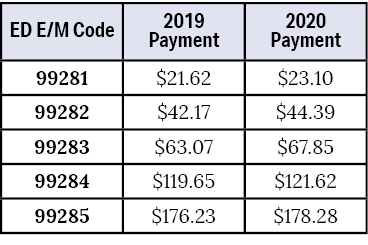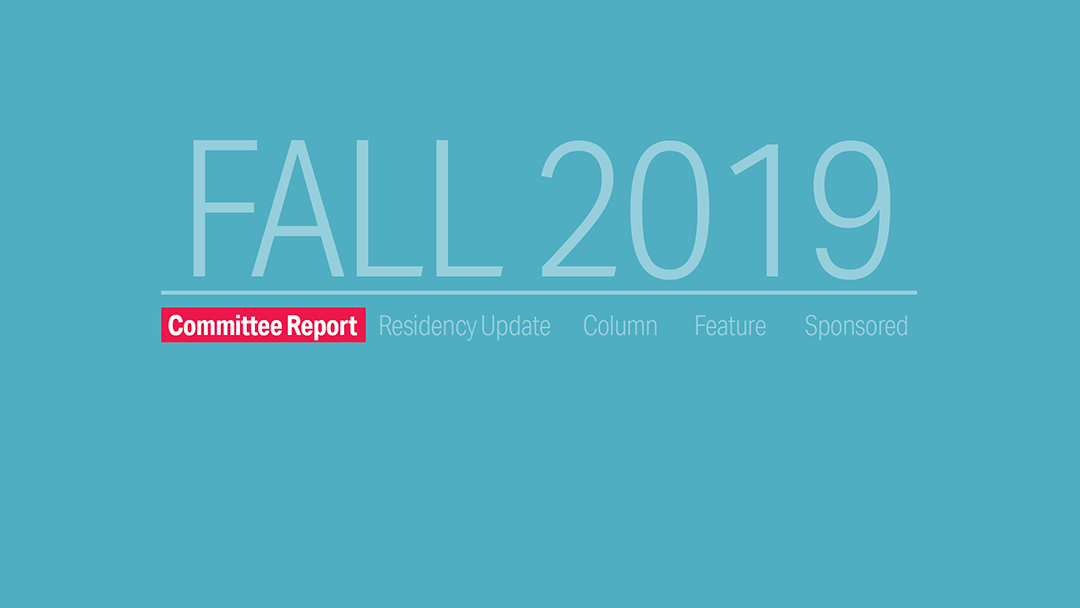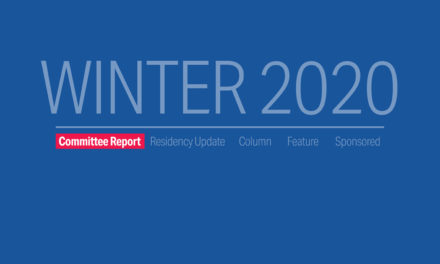Fall 2019: Med Economics: The 2020 CMS Physician Fee Schedule Proposed Rule
On July 29, CMS issued its proposed rule for the CY 2020 Physician Fee Schedule (PFS). The proposed changes have the potential to affect payments to physicians and other healthcare professionals under Medicare Part B. Publication of the final rule usually occurs in November, with implementation on or after January 1, 2020.
This article will briefly summarize a few areas that are of interest to emergency medicine before discussing what is perhaps of greatest interest: the ED evaluation & management (E/M) codes. Further information can be found at bit.ly/regsandeggs, or you can always head to cms.gov to read all 1704 pages for yourself.
Physician Supervision of Physician Assistant Services
CMS is proposing clarifications to the PA supervision regulations, stating that the Medicare requirement is met if PAs deliver their services “in accordance with state law and state scope of practice rules” (with medical direction and appropriate supervision as required by state law). In the absence of state law, physician supervision “would be evidenced by documentation in the medical record of the PA’s approach to working with physicians in delivering their services.”
Merit-Based Incentive Payment System (MIPS)
Regarding MIPS, there are number of items in the proposed rule, including increasing the threshold for bonus payments, increasing the threshold to become an exceptional provider, and increasing data completeness requirements.
Opioid Use Disorder Coverage
Because emergency departments are not certified by the Substance Abuse and Mental Health Services Administration (SAMHSA), emergency medicine is not included in the new benefits for opioid use disorder coverage. However, CMS is interested in creating bundled services with possible inclusion of medication-assisted treatment (MAT) initiation in the ED for reimbursement.
Ambulance Physician Certification Statement
CMS is proposing greater flexibility around who can sign for ambulance transfer.
ED E/M Codes
ACEP is always awaiting the PFS proposed rule, but this year even more so as the ED E/M codes are included. This has been a long wait, as they were presented by ACEP at the RUC meeting in April 2018. Prior to that meeting, CMS had identified these codes as potentially mis-valued.
Following the RUC presentation and proceedings, CMS is now proposing an increase to the ED E/M codes for 2020. This has the potential to result in a large positive financial impact for emergency medicine. With CMS recognizing that the increases better reflect the intensity of the services we provide, it also has the potential to augment our position that ED services have become more rigorous.
EM Payment Changes per the 2020 CMS PFS Proposed Rule:

To fully put this into context: given the high utilization of these codes, the net effect of these increases is projected to result in over $130 million more dollars to emergency medicine. Each. Year.
However, when playing a budget-neutral game, it is prudent to exercise caution when victorious so as to not pour salt onto the wounds of those who must lose part of the pie. And before emergency medicine was even able to remind itself not to grab the Morton’s, we received a bit of a gut check after a full reading of the proposed rule.
Perhaps you have heard reference to Table 111 or to a 7% reduction in emergency medicine reimbursement. In the CY 2020 proposed rule, CMS included impact tables to show projected estimates if another increase to E/M codes were to be made in 2021—but these would be for outpatient and office E/M services. So if this were to go into effect, emergency medicine would have to give up some of its newly-acquired pie. Other facility-based specialties—radiology, pathology, anesthesia—would feel this pain as well. Clearly, this portion of the rule now has the laser focus of ACEP’s reimbursement advocacy efforts, and any updates will be provided. ■
Samantha manages fcep.org and publishes all content. Some articles may not be written by her. If you have questions about authorship or find an error, please email her directly.








